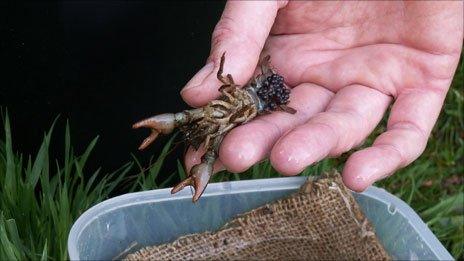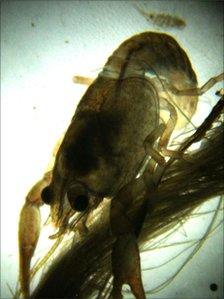Crayfish bred in Brecon to try and save species in UK
- Published

It is hoped the crayfish from the Brecon hatchery could replenish UK stocks
Hundreds of native crayfish bred in Powys will be released at a secret site in Cornwall to slow the decline in the species.
White clawed crayfish are endangered because of the spread of the invasive American signal crayfish, which compete for habitat and food and carry a fungus fatal to the UK species.
Environment Agency Wales bred the crustaceans at its hatchery in Brecon.
The agency is now looking to release more at sites across the UK.
According to the agency, research suggests white clawed crayfish could die out within 20 years.

The Brecon crayfish have a 75% breeding success rate
The breeding programme at the Cynrig hatchery began as a way to try and stop the crayfish disappearing from UK waters.
Environment Agency Wales officer Oliver Brown said: "The juvenile crayfish in our breeding unit at Cynrig have thrived beyond all expectations.
"Our 75% survival rate meant that we released a number of crayfish at a site in Wales last year to allow room for the others to grow.
"We are now searching for new havens across England and Wales for crayfish populations and hope to take our breeding programme further so that ultimately we can release more of this threatened species back into the wild."
Conservationists are also launching a website which aims to serve as a "one-stop shop" for crayfish information for professionals and members of the public.
Invertebrates
The website is a collaboration between the Environment Agency and Buglife, a charity for invertebrates, and aims to link up conservation efforts to save the species around the country.
Buglife's crayfish conservation officer Kate O'Neill said: "Many organisations are making valiant efforts to save the white clawed crayfish, but co-ordinating these efforts at a national scale can be difficult.
"The new web resource will enable different organisations to co-ordinate their crayfish conservation work.
"The new crayfish website also has information on how the public can get involved in conserving one of our largest freshwater invertebrates."
Buglife will monitor the crayfish once their populations have established.
Frances Attword, a crayfish specialist from the Environment Agency, said the main challenge was protecting them from the plague carried by their American competitors.
She told BBC Radio Wales: "The American crayfish compete because they are bigger and more robust and they breed a lot faster but they also carry a plague which kills our native crayfish.
"Even if people move waters where that plague has been, it can wipe out a whole population of white clawed crayfish- it's a problem across Europe."
The Environment Agency is looking for new sites across the UK where more crayfish can be released into the wild, where they will be safe from signal crayfish and other threats like fishing.
- Published26 November 2010